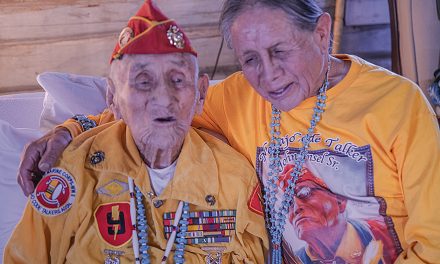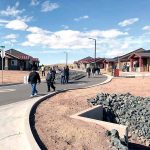
Capital Briefs: Red Water Pond opposes NRC plan for uranium waste
PINEDALE, N.M.
On Oct. 16, the Red Water Pond Road Community Association, which was founded in 2006 by residents near the Northeast Church Rock Mines, the Tronox Quivira Mines, and the United Nuclear Corporation Mill Site, restated their opposition to the transfer of uranium mine waste from the mines to the Mill Site, located approximately one mile from the border of the Navajo Nation.
During the meeting, residents pleaded with the U.S. Nuclear Regulatory Commission to remove the waste to an appropriate site far from the boundaries of the Navajo Nation.
Residents said they do not want to witness another catastrophic event like the Church Rock Uranium Mill Trailing Spill of July 1979.
Valinda Shirley, executive director of the Navajo Environmental Protection Agency, said, “The abandoned uranium mines have severely impacted the Red Water Pond Road Community.
“Furthermore,” she said, “the draft Environmental Impact Statement, prepared by the U.S. Nuclear Regulatory Commission, found serious impacts to groundwater, public and occupational health, and historical and cultural resources from past uranium activities at all of the community’s mine sites.
President Jonathan Nez requested a second extension of the comment period on the draft EIS.
Shirley said, “The Navajo Nation EPA continues to support the community through research, data collection, technical assistance, and to provide resources to improve the conditions.”
Nez said, “The Navajo people have endured decades of radiation exposure and contamination caused by uranium mining and production, and continues to impact the health of individuals, families, and communities.
“Together, we strongly oppose the proposed amendment that would allow the transfer of uranium mine waste and contamination just a short distance from the Navajo Nation and the homes of our Navajo people,” he said.
There are approximately 524 abandoned uranium mine sites on the Navajo Nation, and the Navajo Nation EPA estimates that there could be far more.
Unfortunately, only 219 of these sites have available funds for clean-up and remediation efforts, leaving a total of 305 unaddressed sites that pose severe environmental and health hazards to surrounding areas and people.
ENDAUM pursues petition against uranium mines
CROWNPOINT – Eastern Navajo Diné Against Uranium Mining on Oct. 19 said it will file written and video testimony and other exhibits to the Inter-American Commission on Human Rights, based in Washington, D.C., on Thursday.
This is in support of Eastern Navajos petition, which states that when the Nuclear Regulatory Commission licensed Hydro Resources Inc. to operate uranium mines in the two Diné communities of Crownpoint and Church Rock, it violated human rights, including the rights to life, health, benefits of culture, fair trial, and property.
HRI is now known as NuFuels, a subsidiary of Canadian mining company Laramide Resources.
The petition says the U.S. Nuclear Regulatory Commission licensed a uranium mine it knows will contaminate groundwater, an important resource of drinking water for communities that suffer increased risk of death and disease from a history of uranium mining and milling.
The U.S. government not only tolerated this but promoted it, Eastern Navajo says.
Judicial Branch thanks Council, gives report
The Judicial Branch on Oct. 19 thanked the Navajo Nation Council and Speaker Seth Damon for the passage of a bill that appropriates $961,400 for unmet needs of its districts and programs.
The legislation next goes to the President Jonathan Nez for his signature or veto.
Also during the fall session, on Monday Chief Justice JoAnn Jayne delivered the branch’s quarterly report to the Council.
Jayne highlighted accomplishments and challenges during the past quarter, which covers July to September.
She said, “Staff, you made sacrifice in the shadow of this pandemic and it’s been almost two years and you are thanked for that.
“We have had a wonderful year even though all of the challenges are there,” she said.
The Navajo Nation’s budget was developed and approved but unfortunately funding for the Judicial Branch for fiscal year 2022 fell short, she said, but a bill for supplemental funds for the branch is pending.
The branch has been open for essential services through a plan with strict protocols to keep staff and the public safe. The branch is in need of recovery services and the funds requested through the bill and ARPA funds will help with recovery.
The effect of the pandemic has been significant, Jayne said, with limits on the number of employees in buildings, cleanings when exposures occur, and the retirement of employees.
There are vacancies difficult to fill such as judges and staff attorneys.
Accomplishments include:
• Probation Services began developing curriculum on its role and responsibilities in the criminal justice system for training Navajo Police Academy cadets and Navajo police officers.
• Peacemaking Program provided services for court-ordered Life Value Engagement sessions and training for local peacemakers through virtual video- and teleconferences.
• Judicial hearing officers are providing exemplary services in addressing domestic violence cases at the district courts.
• Dilkon, Crownpoint and Ramah judicial districts have resumed resource meetings virtually with local service providers.
• To’Hajiilee Court is working with Canoncito Band of Navajo Health Center to develop training to teach health professionals to assist domestic violence victims with pro se filings of petitions for protection orders.
• Tuba City District Court has taken the lead in providing virtual pro se classes to the public for individuals who wish to represent themselves in court.
IHS awards $7.7 million for Community Health Aide Program
WASHINGTON – The Navajo Nation’s Division of Behavioral and Mental Health has received a $669,000 grant from the Indian Health Service to expand the Community Health Aide Program, the IHS reported Monday.
The grant is part of a total of $7.7 million over two years to 10 tribes and tribal organizations to support the expansion.
Elizabeth Fowler, acting director of the IHS, said, “The Community Health Aide Program is vital to rural and remote communities across Indian Country as the need for access to care in primary, dental, and behavioral health increases.
“The funds we are announcing today enable greater flexibility for tribes and tribal organizations and target resources for planning, assessing feasibility, and implementation of the program,” she said.
Seven tribes and tribal organizations are receiving $669,000 over two years through the CHAP Tribal Assessment and Planning grant program.
Three tribes and tribal organizations are each receiving $1 million over two years through the CHAP Tribal Planning and Implementation grant program.
IHS designed the grant programs from feedback received during formal tribal consultation and stakeholder engagement across the Indian health system on the use of Fiscal Year 2020 funding to support expansion.
Diné Action Plan signed into law
On Oct. 14, President Jonathan Nez signed the Navajo Nation Council resolution that establishes the Diné Action Plan, which uses the traditional concepts of thinking, planning, life and reflection to help confront public safety issues such as violence, substance abuse, suicide and missing and murdered Diné relatives.
The bill was sponsored by Delegate Amber Crotty.
Nez said, “The plan is embedded with the teachings and disciplines of our ancestors and Navajo elders that will help improve strategies, policies, and procedures for the health and well-being of our Navajo people.”
Crotty said, “Our ancestors and elders used the same framework to survive and heal, and we must now use those teachings to overcome the challenges we face.”
An advisory group will develop and implement the goals and objectives of the plan.
Virtual seminars for small businesses
ST. MICHAELS –The Navajo Nation’s Tourism Department, in collaboration with Utah State University-Blanding, is offering free virtual seminars for local businesses, with the next on Oct. 25.
The first seminar, held Monday, focused on E-Commerce and Website Fundamentals. The second will feature leveraging Google Search and Maps to advertise and begins at 1 p.m. on Oct. 25.
The two seminars are aimed at small businesses in the Monument Valley, Oljato and Kayenta communities.
To support local businesses, Navajo Tourism and USU developed these virtual seminars to support tour guides, vendors and artisans.
Because the pandemic and economic conditions have severely impacted small business owners, Navajo Tourism and USU-Blanding focus on assisting entrepreneurs in the tourism industry to recover and thrive.
The workshops are broadcast from the Small Business, Professional Development, Application, Resources, Certification building at USU-Blanding.
Meghan McFall, the SPARC director and SBDC business consultant for the four corners region, will teach the seminars.
Plans are underway for services and classes to be offered in Chinle at Navajo Technical University.
Information: Meghan McFall, meghan.mcfall@usu.edu, or Chris Burnside, cburnside@discovernavajo.com.








 Highway 264,
Highway 264, I-40, WB @ Winslow
I-40, WB @ Winslow